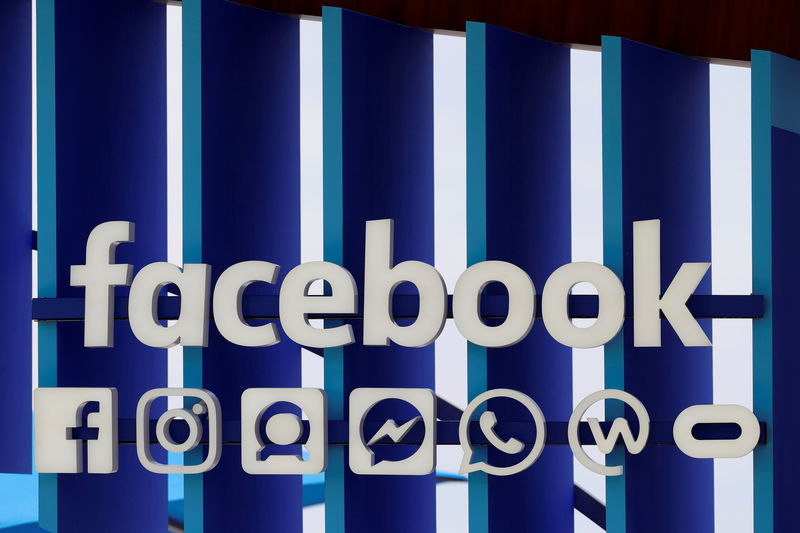(Bloomberg Opinion) -- Facebook Inc (NASDAQ:FB).’s idea of a global cryptocurrency may get demoted to something more humble. You can almost hear a collective sigh of relief from Asian central banks.
The original plan was to create a synthetic unit that would hold its value against a basket of existing currencies. Libra was being billed as a future rival to the greenback, a blockchain innovation that would promote financial inclusion by catering to the daily needs of billions of people. It’s a so-called stablecoin, a virtual currency that avoids the wild, speculative gyrations of Bitcoin by tracking the value of a low-volatility asset such as the U.S. dollar.
However, a medium of exchange is only one use of money. If a global stablecoin like Libra, fully backed by reserve assets, came to be widely viewed as a store of value, “it could weaken the effect of monetary policy on domestic interest rates and credit conditions, particularly in countries whose currencies are not part of the reserve assets,” a Group of Seven working group noted recently.
That’s not a risk central banks in Jakarta or Mumbai would want to take. The outsize role of the dollar in global finance already restricts their maneuverability by triggering untimely surges in capital inflows or outflows. Who wants a new straitjacket? Even governments wouldn’t be happy. Domestic currency held by the public costs a fraction of its face value to produce. The difference is a source of profit for fiscal authorities. A shift in consumer preferences toward Libra would lower this seigniorage income.
Given that India and Indonesia are Facebook’s No. 1 and No. 3 markets respectively, by number of users, the only way the social networking site can surmount these monetary and fiscal obstacles and get Libra off the ground may be to drop the plan of a brand-new global currency. “Instead of having a synthetic unit... we could have a series of stablecoins, a dollar stablecoin, a euro stablecoin, a sterling pound stablecoin, etc.,” David Marcus, who heads the Libra project for Facebook, told a banking seminar on Sunday, according to a Reuters report.
Going down this route would undoubtedly dilute the proposition. In this possible new avatar, Libra would be no more contentious than Tether, the world’s most used stablecoin. But it would also mean that Beijing, which has been spurred on by Facebook’s ambitions to put the finishing touches to a five-year plan for a digital yuan, would steal a march over Western tech firms in money matters.
With a single global token, Facebook could have leapfrogged China by pushing out its currency “to almost 2.5 times the user base of WeChat or Alipay overnight,” says Martin Chorzempa, an analyst at the Peterson Institute for International Economics in Washington. A scaled-down Libra considerably reduces that advantage.
The official Chinese crypto would also be a stablecoin, backed fully by yuan assets. But while Facebook is still a fledgling player in payments, digital wallets like WeChat Pay and Alipay are already ubiquitous within China and increasingly visible even outside the mainland, thanks to Chinese tourists. At present, one needs a yuan-denominated bank account to put money into the wallets, which limits international usage. However, once anybody, anywhere can stuff these and other wallets with easy-to-obtain digital yuan, not only would the mainland’s economy be able to junk physical cash entirely, but also the stalled project of internationalizing the Chinese currency would receive new momentum. The share of yuan in global currency trade, stuck at a modest 4.3%, would get a fillip.
Would this new order be any less intimidating to the rest of Asia than accepting a subjugation of their policies to Western tech? There are arguments for and against.
One advantage in letting Beijing take charge of a globally popular yuan crypto is that the People’s Bank of China will be standing behind it. The Facebook-sponsored, Switzerland-based Libra Association, were it to operate a separate global currency, wouldn’t have the same heft. The logic is simple. The association may have 1:1 reserve backing for the Libra coin it issues, but sooner or later banks will get into their usual act of creating money from thin air by making loans in the digital currency. Who’ll guarantee the stability of this larger edifice? “With a basket-based stablecoin, there is no-one to call,” as ING Bank NV economists Teunis Brosens and Carlo Cocuzzo say.
The People’s Bank would welcome the calls. Every appeal to provide liquidity support for its crypto would mean greater recognition of China’s status as the new global superpower: Beijing would get a step closer to its goal of making the yuan the dominant world currency, albeit in a tokenized form. But the flip side is worrisome. Digital currencies won’t offer the same perfect anonymity as cash. While Facebook’s record of protecting users’ privacy isn’t saintly, governments in New Delhi or Jakarta will hardly welcome the prospect of exposing their citizens’ lives to Chinese authorities.
In the end, it’s Donald Trump’s stance on Libra that should perplex Asia. The U.S. president has blasted Facebook’s plan. Why is a leader otherwise so determined to delay China’s rise on the world stage not willing to hand over the reins of the dollar’s global dominance to Western tech companies whose behavior the U.S. can still influence? If the sticking point is oversight, it may still be possible to hammer out a compromise, and rescue a global stablecoin.
Fitch Ratings says it expects Facebook CEO Mark Zuckerberg to reveal more about how Libra may be regulated in his congressional testimony this week. That may hold the clue to where the next master of Asian central banks will reside: Silicon Valley or Beijing.
